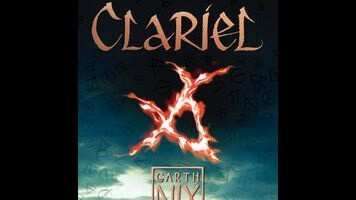In the crowded field of young-adult fantasy, Garth Nix is a welcome breath of baroque, dark, weird air. Nix’s bestselling Old Kingdom series—Sabriel, Lirael, and Abhorsen—launched in 1995, two years before the first Harry Potter book, and it’s one of the few million-selling modern YA fantasy series that doesn’t feel influenced in any way by either Harry Potter or Twilight. It has its own elaborate vocabulary and mythology, full of heroic necromancers who manipulate the dead with bells, and an ancient Charter that forms most of the world’s magic into a rigidly prescribed system of symbols that can be manipulated for powerful effect. It has its own ancient deities and demigods, opaque in intent and affiliation. Underneath the complicated backstory, the original trilogy has a fairly standard Chosen One Saves Ancient Kingdom From More-Ancient Evil arc. But the details make the difference, and the books have a compelling density, and a richly specific flavor that sets them apart from their relatives in the Harry Potter and Edward Cullen fiction-family trees.
Clariel is Nix’s first novel-length return to that world since Abhorsen closed out the first series in 2003. It’s a prequel set centuries earlier, filling in the youthful history of a relatively minor antagonist from the first series. But the revelation of her identity comes casually, in an Author’s Note at the end that might as well start off, “See final page of book for answer key.” It’s a small bonus for longtime readers, rather than a fundamental part of the book. Clariel doesn’t assume a thorough knowledge of the Old Kingdom setting so much as it keeps the story simple enough that the mythology takes care of itself. Even as a prequel, it works fine as a stand-alone, or an accessible inroad to Nix’s fantasy.
In a YA field so thoroughly obsessed with love triangles and romantic connections, protagonist Clariel stands out for her assured asexuality: She’s tried sex, and emotional connections in general, yet doesn’t see the appeal. More than anything, she wants to be alone in the woods as a Borderer, a forest ranger working in blessed isolation from the rest of humanity. But at age 16, she doesn’t have the freedom of choice, and her parents—a talented, imperious goldsmith and her meek husband—have brought her with them to the crowded capital city of Belisaere, where she’s expected to attend finishing school, learn magic, marry the son of an unpleasant political ally, and become a passive pawn in a plot to wrest power from a dispirited king who refuses to step down or to rule his kingdom. As she keeps loudly restating her one true ambition to people who ignore, diminish, or dismiss her, she comes across like any modern teenager who’s sure she knows what’s going on better than any adult. Then magic comes into play, and changes what’s possible—for Clariel, for the conspirators trying to use her, and for some ancient powers seeking to destroy the kingdom.
Clariel starts in an accessible but frustrating place, with a main character who seems shrill and ineffectual as she endlessly repeats herself, makes plans without acting on them, and trudges through interactions that seem irrelevant to her future, except in introducing new characters into the mix. But it evolves into a breathless, thrilling adventure where Clariel’s impotence and claustrophobia fuel choices that are monstrous, but not surprising, or out of character. The archetypes are exaggerated—it strains belief that Clariel’s parents are so profoundly myopic, or that the villains are so nakedly villainous without early consequences. Like George R.R. Martin’s Song Of Ice And Fire books, Nix’s novel plays heavily on themes of outsized injustice and thwarted good intentions to get readers riled, then takes them to extremely dark places as a result of those injustices. Clariel is fleeter and more intense than the series’ other books, given that it’s a stand-alone where the major action has to be resolved in a single novel. (Nix’s next planned book is another prequel about a different character altogether.) It seems small by comparison with the rest of the series, since it primarily deals with a single character and her single goal, but for fans of the series, it’s a welcome and worthy return, and for newcomers, it’s a first step up a dauntingly complicated ladder. This outing is a thinner version of Nix’s usual heady brew, but it has all his usual peculiar, appealing flavor.









































